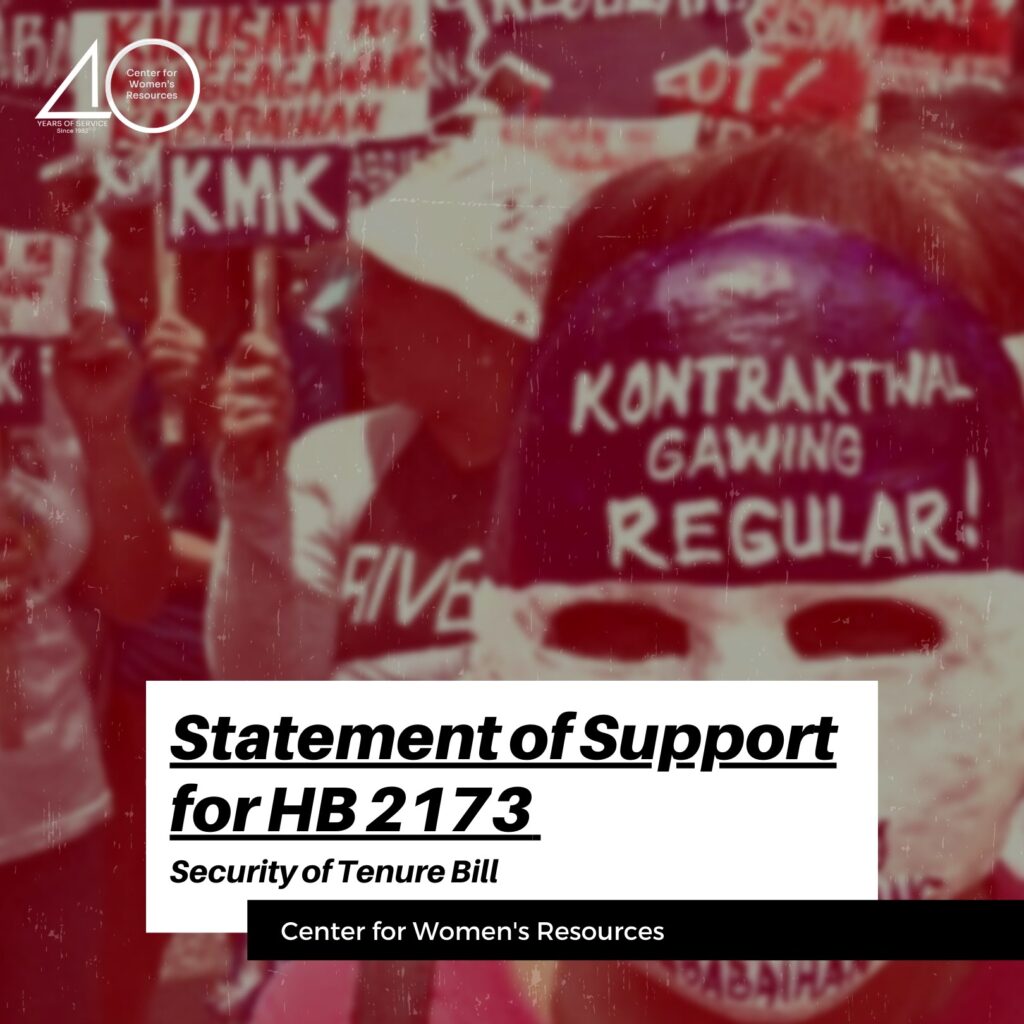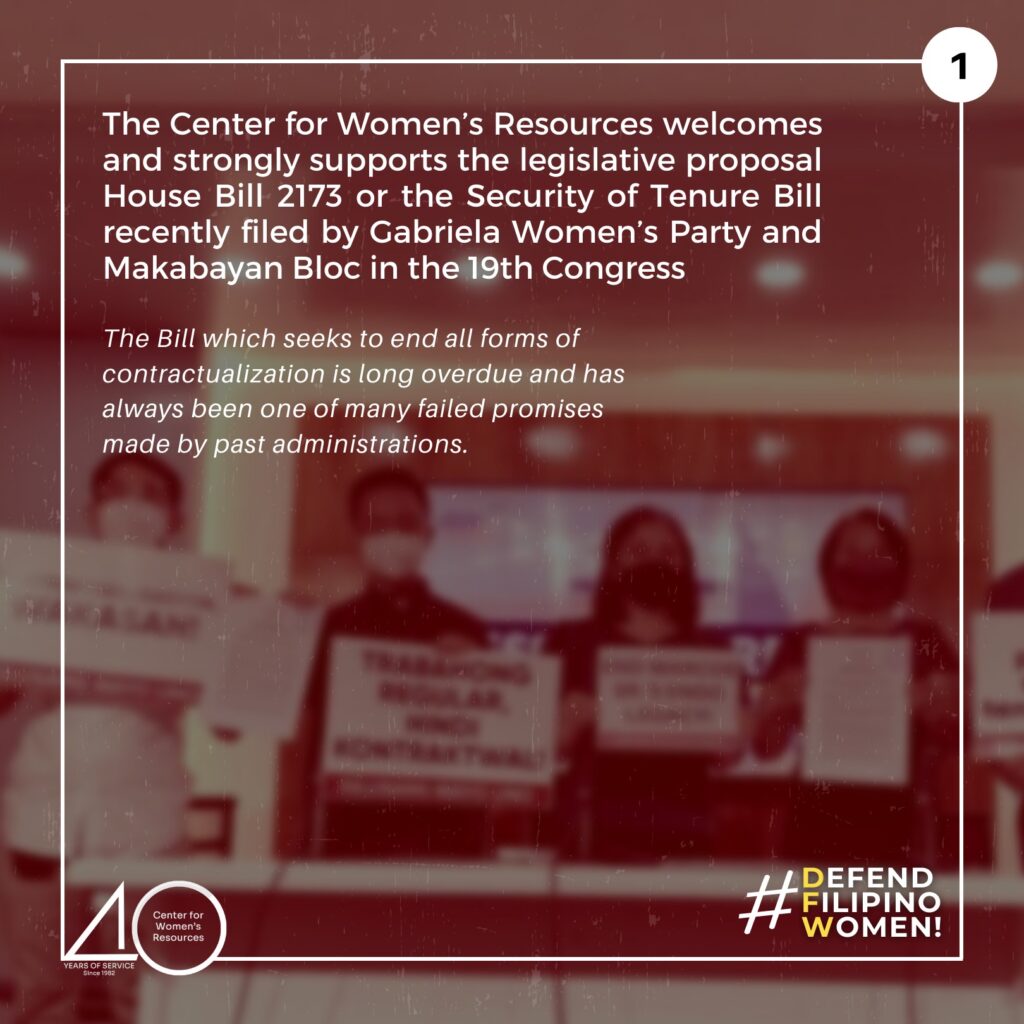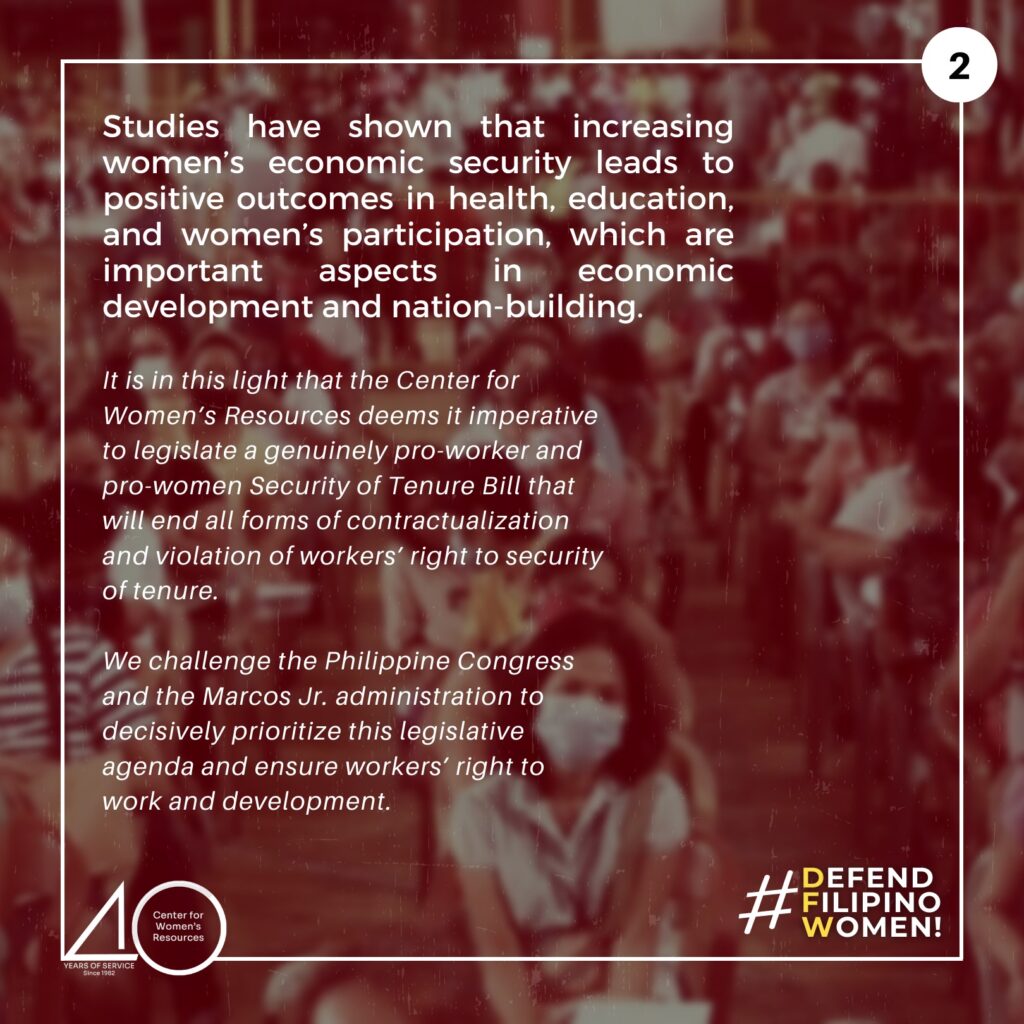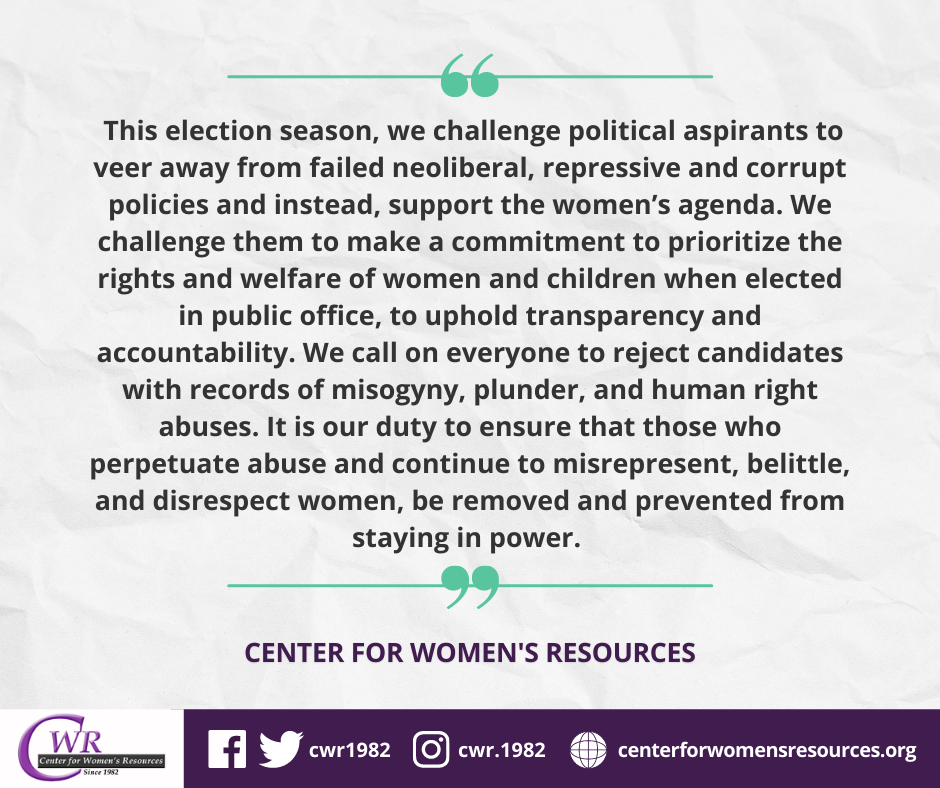The Center for Women’s Resources joins the families and friends of the disappeared, advocates and human rights defenders, in renewing the calls to end involuntary disappearance and human rights violations in the Philippines.
The abduction and disappearance of Elizabeth “Loi” Magbanua, Ma. Elena “Cha” Cortez Pampoza and Elgene Mungcal add to the long list of names of activists and community organizers who were forcibly taken and disappeared. Data from human rights organization Karapatan showed that there had been 254 victims of enforced disappearances in the Philippines — from the Arroyo administration up to July 2021 during the Duterte administration.
Last May 3, Loi Magbanua, a labor organizer and women’s rights advocate, was abducted along with fellow labor organizer, Alipio “Ador” Juat. A few days later, Ador communicated with his family, informing them that unidentified men abducted and forced them into separate vehicles. The two are believed to be detained against their will in a military camp.
On July 3, peasant organizers and human rights defenders Cha Pampoza and Elgene Mungcal went missing in Moncada, Tarlac. Before her disappearance, Cha’s family had been subjected to harassment by uniformed personnel of AFP and PNP.
We urge the public to express support for the families and friends of victims of enforced disappearances and other human rights violations, especially with the widespread climate of impunity. The impunity enjoyed by perpetrators of enforced disappearances and extrajudicial arrest and detention is exacerbated by Duterte’s Executive Order 70 – the ‘whole of nation approach’ that intensifies brutal attacks towards activists and human rights advocates. It is high time to raise our voices and speak out against these rights violations and demand justice.
Finally, we challenge the Marcos administration to show its sincerity in addressing the spate of involuntary disappearances and human rights violations in the country by revoking Duterte’s EO 70, dismantling the NTF-ELCAC, and promptly ratifying the International Convention for the Protection of All Persons from Enforced Disappearance.
Statements and Media Releases
Statements and media releases and statements from the Center for Women’s Resources
Statement of Support for HB 2173 – Security of Tenure Bill
The Center for Women’s Resources (CWR) welcomes and strongly supports the legislative proposal House Bill 2173 or the Security of Tenure Bill recently filed by Gabriela Women’s Party and Makabayan Bloc in the 19th Congress. The Bill which seeks to end all forms of contractualization is long overdue and has always been one of many failed promises made by past administrations.
With the current pandemic situation, high unemployment rate, the dwindling income of Filipino families, rising prices of consumer goods, and concerning increases in poverty and inequality, CWR believes that Congress and this administration must immediately pass legislation to protect and advance workers’ rights.
Even before the pandemic, Filipino women workers are found in precarious labor and 60% are considered economically insecure. With the economic contraction brought by the pandemic, workers under contract were pushed to further insecure conditions as they were the first to lose their jobs. They live at a critical point, vulnerable, and often with no buffer against economic shocks.
CWR, in its recent study on the conditions of women workers amid the pandemic found the following:
1. Contractual workers have fewer employee benefits like company medical insurance, and this forces employees/workers to pay out-of-pocket for expenses that under normal circumstances are covered by an employer. Although the government mandated employers to pay for certain benefits such as SSS, Philhealth and PAG-IBIG for all types of workers, some employers do not pay for these benefits. Other benefits that contract workers do not receive compared to regular workers include paid vacation/ sick leave, and 13th month pay.
2. Contract workers need to provide for their own retirement plans and savings for periods of unemployment.
3. “No work, no pay” rule imposed on employees by service contracts and contract workers.
4. Low wages are a disadvantage for employees who are hired on a flexible basis. Workers in these arrangements are much more likely to earn wages that are at or near the minimum wage and earn significantly less than regular workers. As a result, many of these workers are working at/or near the poverty level.
5. Contractualization undermines worker’s right to organize and form unions.
The road to pandemic recovery presents an important opportunity to reverse the trend of disadvantaged workers through enacting the Security of Tenure Bill. Further, many studies have shown that increasing women’s economic security leads to positive outcomes in health, education, and women’s participation, which are important aspects in economic development and nation-building.
It is in this light that the Center for Women’s Resources deems it imperative to legislate a genuinely pro-worker and pro-women Security of Tenure Bill that will end all forms of contractualization and violation of workers’ right to security of tenure. We challenge the Philippine Congress and the Marcos Jr. administration to decisively prioritize this legislative agenda and ensure workers’ right to work and development.
Unite against the return of the Marcoses to Malacanang! Unite for genuine freedom, development, and democracy!
The Center for Women’s Resources joins the commemoration of the 1986 EDSA People Power that led to the fall of the Marcos Dictatorship as we unite to prevent them from returning to Malacanang in the coming National Elections.
Today, we remember those who have been killed, tortured, disappeared, raped, detained, and many others who lost their homes and livelihood during Martial Law. We vow to never forget the attacks against the people, to hold the Marcoses accountable for their ill-gotten wealth, to combat disinformation and historical revision, and to never again allow them to return and maintain power.
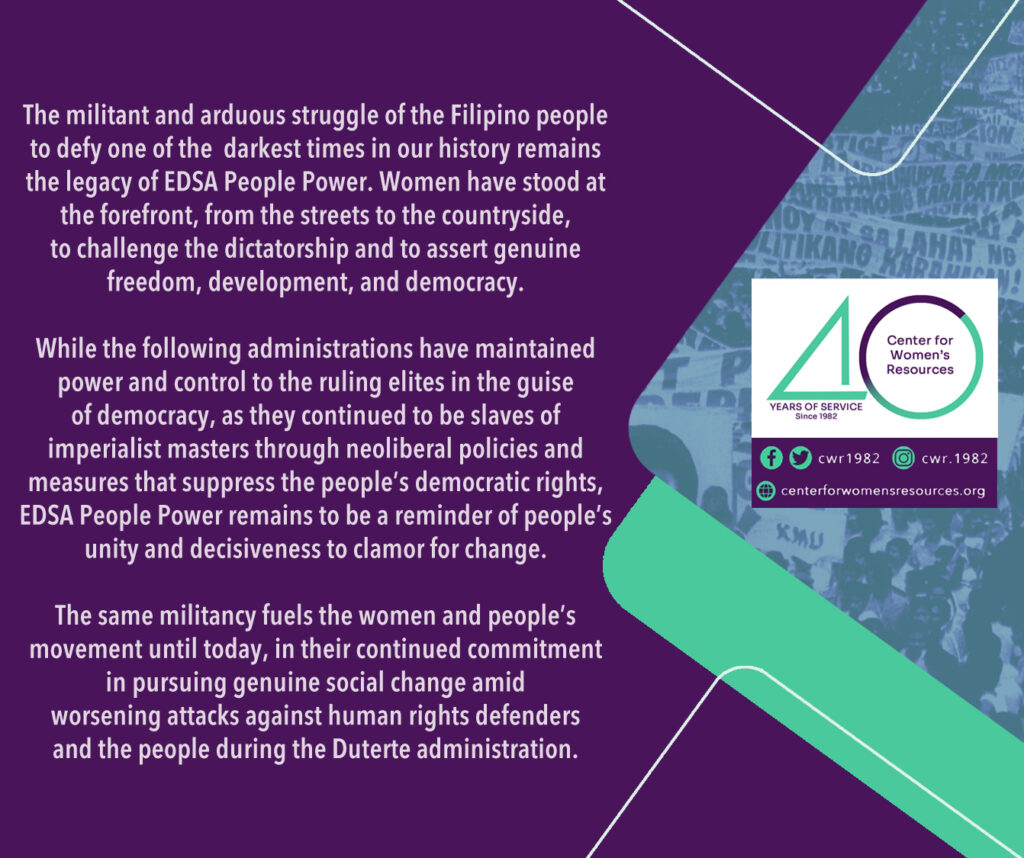
The militant and arduous struggle of the Filipino people to defy one of the darkest times in our history remains the legacy of EDSA People Power. Women have stood at the forefront, from the streets to the countryside, to challenge the dictatorship and to assert genuine freedom, development, and democracy.
While the following administrations have maintained power and control to the ruling elites in the guise of democracy, as they continued to be slaves of imperialist masters through neoliberal policies and measures that suppress the people’s democratic rights, EDSA People Power remains to be a reminder of people’s unity and decisiveness to clamor for change.
The same militancy fuels the women and people’s movement until today, in their continued commitment in pursuing genuine social change amid worsening attacks against human rights defenders and the people during the Duterte administration.
In their campaign for the two highest seats in office for the 2022 National Elections, Marcos Jr. spews empty rhetoric on “unity” while Sara Duterte vows to continue what his father has started. Thus, a continuation of ballooning debt, skyrocketing prices, misogyny, rabid human rights violations and failed pandemic response. There is no basis of unity with them when there is no justice to their atrocities.
We call on women and all Filipino people to commemorate People Power by rejecting tyrants, plunderers, and human rights violators, and prevent them from returning to power. We must work hand-in-hand to fight their dirty tricks of disinformation, fraud, and violations especially towards the national elections. Ultimately, we must continue to exercise our right to political participation beyond the 2022 elections.
Stand for women’s rights and welfare this 2022 National Elections
The Center for Women’s Resources enjoins everyone to stand for women, and with women for the 2022 National Elections.
As the official campaign period for national positions begins today, February 8, we call on all women to amplify their voices and ensure that candidates for electoral positions prioritize the welfare of women and heed their calls for genuine change.
In the last six years, we have witnessed the decades-long exploitation and oppression of Filipino women worsen, especially those belonging to the basic sectors. Under the Duterte administration,they have experienced further economic and socio-political crises. Duterte’s adherence to the neoliberal agenda continued to prioritize profit of corporations, landlords, and the ruling elite instead of the welfare of ordinary people, aggravating inequality and maldevelopment in the country.
Deregulation of prices of food and other basic commodities have severely impacted the lives and livelihood of women who carry multiple burdens at work and in their homes. In 2018, the implementation of TRAIN Law caused the inflation rate to surge from 3.45% in January to 6.7% in September of the same year. Furthermore, workers in the National Capital Region experienced the least and lowest wage increase compared to past administrations, with only two wage hikes in the last six years, with a cumulative percentage increase of 9.4%.
Agricultural liberalization through ease of restrictions on imported products and lack of support for local food production leave farmers to suffer in landlessness and debt. One year after the implementation of the Rice Tariffication Law, local rice farmers lost an estimate of Php 68.18 billion as palay farmgate prices fell by Php 3.62 per kilo. The price of palay also dropped to as low as Php10 per kilo in 2020.
Women who belong to the informal economy continue to experience lack of social protection measures and are most vulnerable to abuses. In total, 1 out of 2 employed women belong to the informal sector. In 2020, CWR estimates that 19.54 million Filipino women are economically insecure.
When the COVID- 19 pandemic hit, the already detrimental conditions of women and their communities were aggravated even more. Lockdown restrictions close down factories and offices leaving thousands of women unemployed. Peasant and indigenous women were prevented from going to their farms and tending to their livelihood, while millions lost their livelihood in the informal sector. Women continue to suffer hunger, poverty, landlessness, and joblessness in the middle of the deadly virus spread. These conditions further put women vulnerable to gender-related abuses.
The failed government response of militaristic lockdowns, arbitrary detentions, and lack of enough social amelioration has further pushed women to find means to survive every day. Repressive policies such as restrictions of mobility and transport for unvaccinated individuals also exist today. Amid all these, shrinking of civic space and direct attacks against rights defenders continue.
This election season, we challenge political aspirants to veer away from failed neoliberal, repressive and corrupt policies and instead, support the women’s agenda. We challenge them to make a commitment to prioritize the rights and welfare of women and children when elected in public office, to uphold transparency and accountability. We call on everyone to reject candidates with records of misogyny, plunder, and human right abuses. It is our duty to ensure that those who perpetuate abuse and continue to misrepresent, belittle, and disrespect women, be removed and prevented from staying in power.
Furthermore, we call on our sisters in the struggle to make our votes matter and be vigilant against any form of electoral fraud and violence. Importantly, we call on all women to continue to stand in the frontlines in our fight for genuine change for ourselves, our families, and our communities. #
On the ratification of the amendments of the Public Services Act
The Center for Women’s Resources raises alarm over the ratification of the amendments to the Public Services Act, which entails 100% foreign ownership to public services such as telecommunication and mass media, power generation, and the transportation sector such as railways, airlines, and logistical facilities.
Ease in restrictions on foreign ownership of public services will mean further control of private corporations and deregulation over prices of public services, burdening Filipino women consumers of higher costs of expenses on goods and services such as electricity, internet, and public transportation. Such services will be more inaccessible to the public, who have suffered the most from the economic impacts of the COVID-19 pandemic.
In his last SONA, President Duterte certified this bill as urgent, along with other bills that will further liberalize the economy as the road to recovery from the economic impacts of the COVID-19 pandemic.
Up to the last months of his term, the Duterte Administration pushes neoliberal measures to ensure profit for foreign investors and multinational corporations while Filipinos continue to suffer rising prices of commodities, job losses, and lack of opportunities.
Further liberalization of public goods and services is not the solution. On the contrary it creates deeper economic problems for future generations. Genuine pandemic recovery should be focused on building back differently, veering away from the same failed economic policies that essentially violate women and people’s right to development. Instead, more sustainable measures should be prioritized – ensuring public healthcare and social protection, increasing wages, providing higher subsidies in domestic agriculture and rural development, and building a national industry. #

